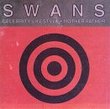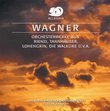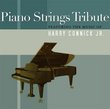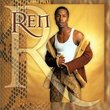| All Artists: Ralph Vaughan Williams, Matthew Best, Corydon Orchestra, Judith Howarth, John Mark Ainsley, Thomas Allen Title: Vaughan Williams: Dona Nobis Pacem/Four Hymns/Toward The Unknown Region/O Clap Your Hands/Lord, Thou Hast Been Our Re Members Wishing: 1 Total Copies: 0 Label: Hyperion UK Release Date: 2/1/1994 Album Type: Import Genres: Pop, Classical Styles: Vocal Pop, Opera & Classical Vocal, Historical Periods, Modern, 20th, & 21st Century, Sacred & Religious Number of Discs: 1 SwapaCD Credits: 1 UPC: 034571166551 |
Search - Ralph Vaughan Williams, Matthew Best, Corydon Orchestra :: Vaughan Williams: Dona Nobis Pacem/Four Hymns/Toward The Unknown Region/O Clap Your Hands/Lord, Thou Hast Been Our Re
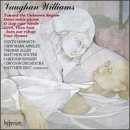 | Ralph Vaughan Williams, Matthew Best, Corydon Orchestra Vaughan Williams: Dona Nobis Pacem/Four Hymns/Toward The Unknown Region/O Clap Your Hands/Lord, Thou Hast Been Our Re Genres: Pop, Classical
Vaughan Williams's contribution to 20th-century choral music is substantial, but several of his works inexplicably remain in relative obscurity, one of them being the unabashedly Brahmsian (and a little Wagnerian) "Toward ... more » |
Larger Image |
CD DetailsSynopsis
Amazon.com Vaughan Williams's contribution to 20th-century choral music is substantial, but several of his works inexplicably remain in relative obscurity, one of them being the unabashedly Brahmsian (and a little Wagnerian) "Toward the Unknown Region." This "song" for chorus and orchestra, Vaughan Williams's first major choral piece, is a richly romantic setting of a poem by Walt Whitman, whose ideas greatly impressed many young artists and musicians in the late 19th century. Another rarely heard work is his Four Hymns, for solo tenor, viola, and strings. This wonderfully sonorous and inventive piece deserves much greater notoriety--an event that certainly will be helped by John Mark Ainsley's fine performance here. The monumental Dona Nobis Pacem-the best known of the works on this program--also receives a strong, dynamic, and compelling reading that places it among the best on disc. --David Vernier Similar CDs
|
CD ReviewsA superior recording reviewer in Down East Maine | Lamoine, Maine United States | 10/20/2000 (5 out of 5 stars) "Matthew Best and the Corydon Singers have made one of the finest, precise recordings of RVW's choral works. No muddy sound from a cathedral, it is clear and precise. The range of warmth and excitement appropriate to each piece will satisfy choral afficionados. Ainsley's interpretation of "Four Hymns" is arresting. "O clap your hands" makes my heart quicken. If you've wanted the "Dona Nobis" THIS is the recording." Great recording, especially the lesser-known works Samer T Ismail | Danbury, CT | 07/07/2004 (5 out of 5 stars) "About half this CD is given over to "Dona Nobis Pacem," Vaughan Williams' 1936 anti-war cantata. Other recordings of this work exist--notably Robert Shaw's Grammy-winning Telarc recording, and Richard Hickox's EMI recording. While this version doesn't quite match the grandeur of Shaw and Hickox, it is still a very good recording in its own right.What makes this CD worth the money, though, is the generous "fillers" that complete the CD. John Mark Ainsley is magnificent in the "Four Hymns" (scored here for tenor, viola, and string orchestra), and the Corydon forces do an admirable job with "Toward the Unknown Region" and "O Clap Your Hands."But my personal favorite track on this CD has to be the finale, "Lord, Thou Hast Been Our Refuge," which skillfully combines a Biblical version of Psalm 90 with the first verse of Isaac Watts' famous poetic version (O God, our help in ages past). It is a surprising work, yet RVW's handiwork is obvious and unmistakeable.If you're a fan of RVW, this CD is definitely worth the money." Great modern-day recording C. Anderson James | Whitestone, NY United States | 06/19/2002 (5 out of 5 stars) "This was actually the second recording of the Dona Nobis Pacem that I purchased. I can't decide if I prefer this modern-day recording or the historical recording (released by Pearl) with the composer conducting. If you enjoy Vaughan Williams or choral music, both should actually be in your library, but this recording's greater sound quality probably qualifies it more for the more casual listener. Enjoy both of them from time to time!"
|

 Track Listings (12) - Disc #1
Track Listings (12) - Disc #1